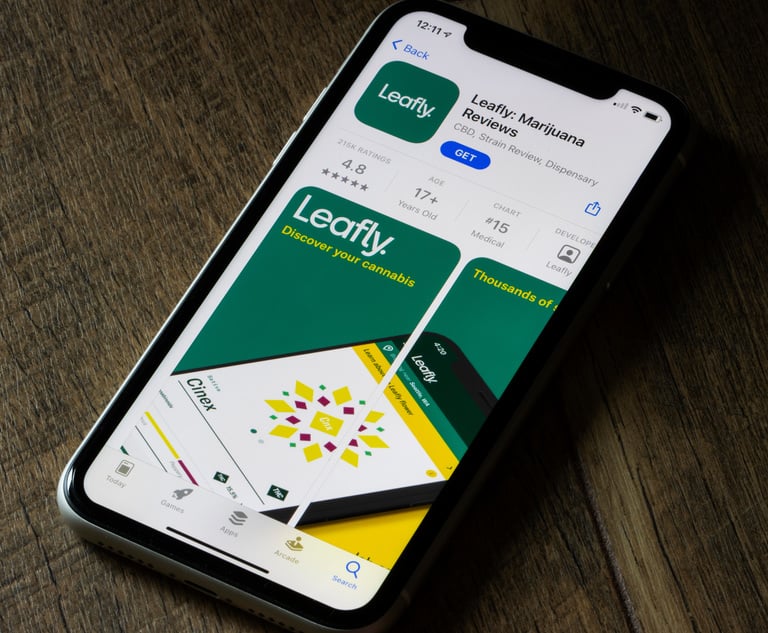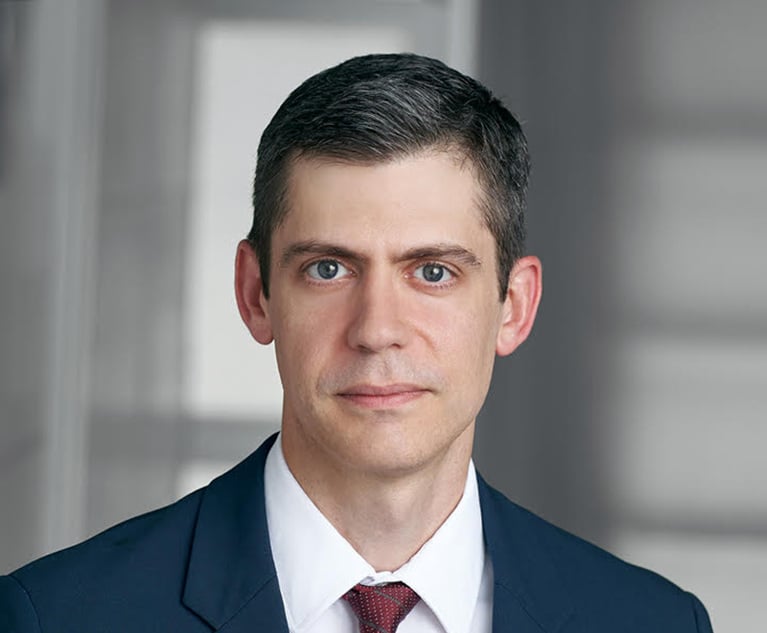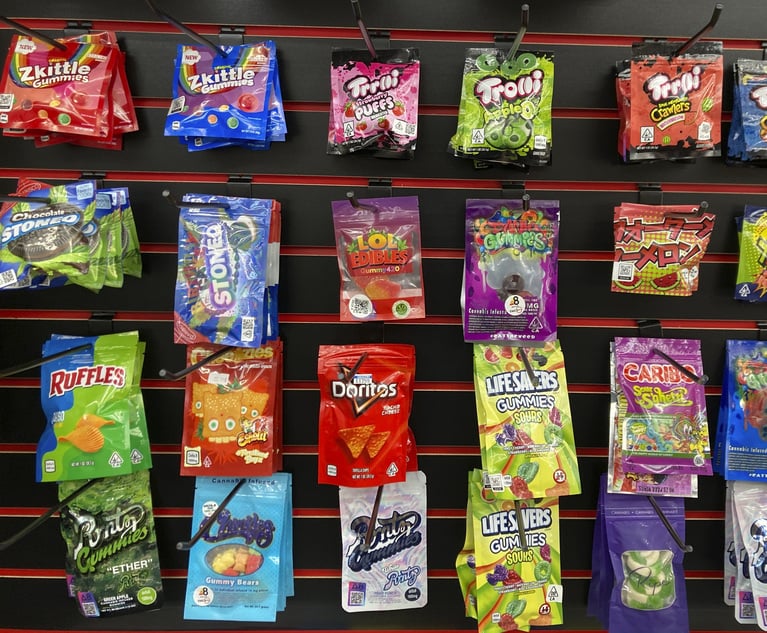Higher Law: Vaping Vexation | Quinn Emanuel's Cannabis Practice | Wilmer Cutler's Big Deal Assist | Big Political Dollars from the Cannabis Industry
Seth Goldberg of Duane Morris talks with Higher Law -- welcome! -- about some observations about vaping and liability. Plus: check out our new podcast with a Quinn Emanuel partner about cannabis cases. And scroll down for Who Got the Work. Thanks for reading!
September 19, 2019 at 04:00 PM
10 minute read
Updated on Sept. 20
Welcome back to Higher Law, our weekly briefing on all things cannabis. I'm Cheryl Miller, reporting for Law.com from Sacramento, where the governor has signed legislation giving cannabis employers (and every other employer) some new labor rules to consider.
This week we're talking about:
• Vaping and the marijuana industry. • Quinn Emanuel's take on cannabis-related securities class actions. • Wilmer Cutler's work on a $282 million cannabis deal • A spike in political donations from the cannabis world
Thanks for reading. Send me your feedback, your story ideas and any interesting case news to me at [email protected]. You can also reach me at 916.448.2935. Follow me on Twitter @capitalaccounts.

Q&A: Cannabis Lawyer Perspective on Vaping
Vaping. Just mentioning the word is probably enough to give some folks in the cannabis industry hives these days.
Through Sept. 12, 380 cases of lung-related illnesses tied to e-cigarettes had been reported in 36 states and one territory, according to the Centers for Disease Control and Prevention. Seven people have died. Authorities have not identified the specific cause of the ailments but "most patients have reported a history of using e-cigarette products containing THC," the CDC said.
Regulatory responses have been all over the map. Michigan has given retailers 14 days to remove flavored vape products, but not THC cartridges, from the shelves. President Trump announced plans to ban most flavored e-cigarettes. New York subpoenaed three vape companies—Massachusetts-based Mass Terpenes, California-based Honey Cut and Michigan-based Floraplex Terpenes—and asked for their help in a state investigation. California Gov. Gavin Newsom says he'll spend money from the state's cannabis tax revenues on an anti-vaping campaign but adds that he doesn't have the authority to ban e-cigarettes unilaterally.
With all this uncertainty and confusion over vaping, I checked in with Seth Goldberg, team lead for Duane Morris' cannabis industry group. Our conversation is edited for length and clarity.
Higher Law: What do lawyers in the cannabis space need to know about what's going on with vaping?
 Goldberg: At least some of the early reporting about the THC-related claims were that it had to do with black market THC vaping. And that's really important, because most of the lawyers who practice in this space are representing state-licensed cannabis operators. And it's important that state-licensed cannabis operators meet the regulatory requirements pertaining to testing their products, knowing what's going in their products and having the right safety protocols in place.
Goldberg: At least some of the early reporting about the THC-related claims were that it had to do with black market THC vaping. And that's really important, because most of the lawyers who practice in this space are representing state-licensed cannabis operators. And it's important that state-licensed cannabis operators meet the regulatory requirements pertaining to testing their products, knowing what's going in their products and having the right safety protocols in place.
Interestingly, state-licensed THC cultivators, processors and dispensaries have requirements to meet with respect to their products, their growing methods, their processing methods. But some of the companies with whom they source some of their materials—for instance, companies that make terpenes or companies that make some of the chemicals that go into the vaping oils—may not be licensed.
HL: That's a liability risk, then, if you're a producer?
Goldberg: From a personal injury or a products liability standpoint, a manufacturer has liability for selling products that have a defect, even if the defect is from a part supplied by another company.
HL: What is the best guidance for clients in this space right now?
Goldberg: The number of claims relative to the overall universe of vaping, whether it's nicotine or THC, seems to be on the low end. It justifies you really monitor it but I think most importantly understanding the safety profile of your product.
State-compliant cannabis operators may have requirements with respect to recalls of products if the products are deemed unsafe. But at this point there's no reason to believe that any specific product is unsafe. It's too early to tell. So unless there's some specific information about a specific product or a product component, that it's unsafe, it appears right now to be time to investigate, to get more information. But there doesn't appear to be a reason to pull products from the shelves at this point.
HL: Which regulatory agencies do we need to be watching right now?
Goldberg: Each state has a state equivalent of the FDA, an office of public safety, a department of health, and states' attorneys general may have an interest in the issue. And from a federal standpoint, of course, you have the FDA. The Trump administration itself has said from the executive branch there may be some prohibition on e-cigarettes.
But it's interesting that because THC-containing cannabis products are still federally unlawful, it may be that a federal prohibition of e-cigarettes would not explicitly cover THC-containing cannabis products. Instead, those products would seem to be in the purview of the Department of Justice under the Controlled Substances Act..
So there is a risk. Cannabis companies should be concerned about the risk that the federal government may use vaping-related health conditions as a reason to crack down on THC cannabis companies.
Higher Law: And conversely, industry groups have said this may be an opportunity for Congress to dive into cannabis regulation.
Goldberg: That's right. Rather than crackdown on THC cannabis-product companies in a piecemeal way that really would not address the overall health issue, a better approach may be to pass legislation like the STATES Act or some other legislation that would allow the FDA or some other federal government agency to regulate THC-containing vape products in a way that ensures public safety.

Podcast: Quinn Partner Talks Cannabis Cases
Last month Higher Law talked to Quinn Emanuel Urquhart & Sullivan partner Robert Becher about the litigation firm's decision to launch a dedicated cannabis practice. Now he's getting the podcast treatment in an interview on Law.com's Legal Speak.
My colleague Patrick Smith asked Becher about the evolution in the practice since the firm started representing clients in the space about two years ago.
"One type of case that we're starting to see fairly frequently .. is securities class actions," Becher said. "There have been a number of securities class actions that have been filed this year.in federal court in the United States, primarily against companies that are based in Canada but have operations in or sell their stock to U.S. investors."
"That's been a fairly new trend as the valuation of these companies has gone up and people have in some instances announced major investigations were underway to their operations," Becher said.
>> You can listen to the full interview with Becher here.

Who Got the Work
Wilmer Cutler Pickering Hale and Dorr is acting as legal advisor to cannabis company Tryke Companies in its planned acquisition by multistate operator Cresco Labs. The $282.5 million deal includes the transfer of Tryke's six dispensaries in Arizona and Nevada. Bennett Jones is advising Cresco Labs.
Lisa "LD" Sergi Trager, general counsel of Pax Labs Inc., has been named interim CEO of the vaporizer company. Trager served as general counsel of MedMen from April 2018 to May.
Gabriel Garcia recently joined Natura Life + Science as general counsel and vice president of legal affairs. A regulatory, tax and corporate attorney, Garcia founded his own business law firm in Sacramento. His resume also includes a stint as in-house counsel at Abbott Laboratories.

In the Weeds…
>> Political contributions from the marijuana industry are up in 2019. The marijuana industry gave $305,675 to members of Congress in the first half of 2019, up from $248,504 for all of 2018, according to an analysis from the anti-legalization group Smart Approaches to Marijuana. The top recipient was Rep. Earl Blumemauer, D-Oregon, the author of a widely circulated blueprint to legalize marijuana in the 116th Congress. [The Hill]
 >> Former FDA commissioner Scott Gottlieb says the feds need to regulate marijuana. "Congress can take specific action to enable easier access to cannabis that's appropriate for medical research. Ultimately, we need to move past the social stigma around cannabis and address these complex public health and regulatory issues objectively," the former FDA commissioner (at left) said in remarks. Gottlieb also said: "If we believe that cannabis has medicinal potential, we should enable suitable research rather than bypass these norms through wholesale legalization." [Politico]
>> Former FDA commissioner Scott Gottlieb says the feds need to regulate marijuana. "Congress can take specific action to enable easier access to cannabis that's appropriate for medical research. Ultimately, we need to move past the social stigma around cannabis and address these complex public health and regulatory issues objectively," the former FDA commissioner (at left) said in remarks. Gottlieb also said: "If we believe that cannabis has medicinal potential, we should enable suitable research rather than bypass these norms through wholesale legalization." [Politico]
>> A marijuana banking bill could finally go to the House floor this month. Rep. Jim McGovern, D-Massachusetts, who chairs the House Rules Committee, said the SAFE Banking Act has enough votes to pass. The bill would offer legal protections for financial institutions that serve state-licensed marijuana businesses. [Boston Herald]
>> The Florida House is jumping into a legal fight over medical marijuana. The First District Court of Appeal said the House of Representatives can intervene in a lawsuit brought by Florigrown challenging the state's vertical integration scheme. Florida Gov. Ron DeSantis has asked the state Supreme Court to consider the issue after the First District found the state's licensing restrictions unconstitutional. [Daily Business Review]
>> Don't rush to New Mexico for your medical weed just yet. New Mexico's health department is refusing, for now, to issue medical marijuana cards to out-of-state residents despite a judge's ruling last month that it should do just that. The state has asked District Judge Bryan Biedscheid to reconsider his ruling and won't give otherwise qualified out-of-staters the needed ID cards until the judge acts. [Albuquerque Journal]
>> Utah will stay out of the marijuana business. Amendments to Utah's medical marijuana law passed by state legislators this week scrapped a proposal to create a public cannabis distribution system. The state will instead issue an additional seven pharmacy licenses for a total of 14. [The Salt Lake Tribune]

Calendar: Time to Mark It
Sept. 21 - The Lucky Leaf cannabis hemp expo takes place in Irving, Texas. Speakers include DLA Piper partner Richard Cheng and intellectual property attorney James Creedon of Creedon PLLC.
Sept. 25 - California NORML and the Cannabis World Congress & Business Expositions present "Cannabis Law: Present & Future" in Los Angeles. Scheduled speakers include Tamara Colson, assistant general counsel at the California Department of Consumer Affairs; Brand & Branch partner Amanda Conley; and Greenbridge Corporate Counsel founder Khurshid Khoja.
Sept. 26-28 - The Cannabis World Congress & Business Expo takes place in Los Angeles Speakers include David Ikenna Adams, associate general counsel at Eaze; Zuber Lawler partner Joshua Masur; and Meyers Nave partner Richard Pio Roda.
Correction: An earlier version of this report misidentified the last name of Quinn Emanuel partner Robert Becher.
This content has been archived. It is available through our partners, LexisNexis® and Bloomberg Law.
To view this content, please continue to their sites.
Not a Lexis Subscriber?
Subscribe Now
Not a Bloomberg Law Subscriber?
Subscribe Now
NOT FOR REPRINT
© 2025 ALM Global, LLC, All Rights Reserved. Request academic re-use from www.copyright.com. All other uses, submit a request to [email protected]. For more information visit Asset & Logo Licensing.
You Might Like
View All
NY Cannabis Marketing Rulings / Rescheduling Effects / Honigman's Work on Trademark Suit / Goodbye
9 minute read
Workplace Weed and Labor Pacts / State AGs and Hemp / Maryland Licensing Suit / Vicente Sues Recruiter
9 minute readTrending Stories
- 1Public Notices/Calendars
- 2Wednesday Newspaper
- 3Decision of the Day: Qui Tam Relators Do Not Plausibly Claim Firm Avoided Tax Obligations Through Visa Applications, Circuit Finds
- 4Judicial Ethics Opinion 24-116
- 5Big Law Firms Sheppard Mullin, Morgan Lewis and Baker Botts Add Partners in Houston
Who Got The Work
J. Brugh Lower of Gibbons has entered an appearance for industrial equipment supplier Devco Corporation in a pending trademark infringement lawsuit. The suit, accusing the defendant of selling knock-off Graco products, was filed Dec. 18 in New Jersey District Court by Rivkin Radler on behalf of Graco Inc. and Graco Minnesota. The case, assigned to U.S. District Judge Zahid N. Quraishi, is 3:24-cv-11294, Graco Inc. et al v. Devco Corporation.
Who Got The Work
Rebecca Maller-Stein and Kent A. Yalowitz of Arnold & Porter Kaye Scholer have entered their appearances for Hanaco Venture Capital and its executives, Lior Prosor and David Frankel, in a pending securities lawsuit. The action, filed on Dec. 24 in New York Southern District Court by Zell, Aron & Co. on behalf of Goldeneye Advisors, accuses the defendants of negligently and fraudulently managing the plaintiff's $1 million investment. The case, assigned to U.S. District Judge Vernon S. Broderick, is 1:24-cv-09918, Goldeneye Advisors, LLC v. Hanaco Venture Capital, Ltd. et al.
Who Got The Work
Attorneys from A&O Shearman has stepped in as defense counsel for Toronto-Dominion Bank and other defendants in a pending securities class action. The suit, filed Dec. 11 in New York Southern District Court by Bleichmar Fonti & Auld, accuses the defendants of concealing the bank's 'pervasive' deficiencies in regards to its compliance with the Bank Secrecy Act and the quality of its anti-money laundering controls. The case, assigned to U.S. District Judge Arun Subramanian, is 1:24-cv-09445, Gonzalez v. The Toronto-Dominion Bank et al.
Who Got The Work
Crown Castle International, a Pennsylvania company providing shared communications infrastructure, has turned to Luke D. Wolf of Gordon Rees Scully Mansukhani to fend off a pending breach-of-contract lawsuit. The court action, filed Nov. 25 in Michigan Eastern District Court by Hooper Hathaway PC on behalf of The Town Residences LLC, accuses Crown Castle of failing to transfer approximately $30,000 in utility payments from T-Mobile in breach of a roof-top lease and assignment agreement. The case, assigned to U.S. District Judge Susan K. Declercq, is 2:24-cv-13131, The Town Residences LLC v. T-Mobile US, Inc. et al.
Who Got The Work
Wilfred P. Coronato and Daniel M. Schwartz of McCarter & English have stepped in as defense counsel to Electrolux Home Products Inc. in a pending product liability lawsuit. The court action, filed Nov. 26 in New York Eastern District Court by Poulos Lopiccolo PC and Nagel Rice LLP on behalf of David Stern, alleges that the defendant's refrigerators’ drawers and shelving repeatedly break and fall apart within months after purchase. The case, assigned to U.S. District Judge Joan M. Azrack, is 2:24-cv-08204, Stern v. Electrolux Home Products, Inc.
Featured Firms
Law Offices of Gary Martin Hays & Associates, P.C.
(470) 294-1674
Law Offices of Mark E. Salomone
(857) 444-6468
Smith & Hassler
(713) 739-1250










